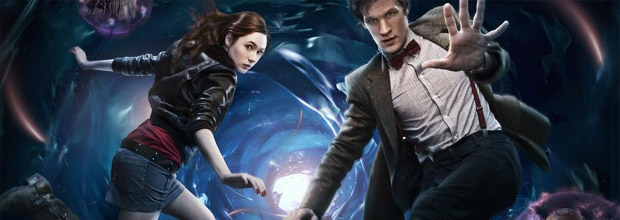
A new Doctor, companion and showrunner have heralded a year of changes for Doctor Who, but it doesn’t end there. Piers Wenger and Beth Willis have taken on Executive Producer duties, alongside Steven Moffat, from the outgoing Doctor Who team of Russell T Davies and Julie Gardner. Here, they reveal the challenges they have faced with taking on such a hugely successful series and why it’s so important for Doctor Who to evolve…
How’s the job been so far?
Beth: “It has definitely been a big challenge taking on this show because we love it so much and why tinker with something that has been as popular, successful and brilliant as it has been? But at the same time we are terribly aware we have to look forward and work out how the show is going to survive in the future. In 2005 the team looked at what was fresh and new then and we have to do a bit of that ourselves. Looking at the episodes we’ve filmed so far we’re starting to see the impact of those changes; what the team has managed to achieve is pretty thrilling.”
Piers: “The thing which is most important to us is telling a good story at the end of the day; that’s always the thing the audience is going to be most demanding about. Beyond that, any changes we have made have been motivated by giving the show the best production values money can buy. It’s the nation’s favourite, and that means it deserves the best.”
The advances in technology over the past five years have inevitably enabled the programme makers to use more sophisticated techniques and create awe-inspiring visual effects. However, a new lead writer and Doctor are undoubtedly what viewers will feel mark the dawn of a new era for the hit series…
Beth: “The fact we have Steven Moffat writing it and Matt Smith starring in it gives the show an inevitable element of change. However, the one thing that hasn’t made us scared about this change was reading Steven’s scripts. I felt deeply honoured and excited to be in a position to be working with such great scripts. It doesn’t really matter what colour you use, where the camera is or how you position a light; Steven and Matt are brilliant which has made mine and Piers’ job much easier.”
What have you found challenging about the job?
Piers: “It is the biggest show on British TV in terms of the level of technical expertise everyone has to be versed in. There were new challenges for Beth and I as we had limited experience in dealing with prosthetics and complex CGI. However, I think the biggest challenge was to move everything forward and making the right calls on what to change and what not to. Doctor Who‘s audience is an incredibly loyal and passionate one and one of the show’s biggest advantages is that it takes you to new worlds every week. Bringing it back with a new writer and leading man after all its success so far, we couldn’t be modest in our ambitions to find new ways for the show to thrill people.”
Do you consider yourselves Doctor Who fans?
Beth: “Steven, myself and Piers were some of the most excited people in the country when we found out Doctor Who was coming back in 2005. Well, in truth, Steven was probably the most excited, but Piers and I weren’t that far behind him!”
Piers: “I’ve always been a fan and I was even accused at the age of eight of shoplifting a copy of Doctor Who Magazine from my local newsagents – completely wrongly I hasten to add. I was accused of it probably because I was in there all the time reading them!”
How would you sum up your experience of reinventing Doctor Who for 2010?
Beth: “There have been loads of challenges, but let’s face it, it’s been a really exciting show to work on. We’ve got a fantastic cast, we’re got a fantastic writer and a fantastic team and we’ve just kind of dived in at the deep end and had a ball!”

